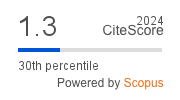Effectivity of 0.15% benzydamine on radiation-induced oral mucositis in nasopharynx carcinoma
Downloads
Background: Nasopharynx carcinoma is the most common malignant tumour in head and neck region. Radiotherapy is the first choice of treatment for nasopharynx carcinoma that had not been metastases. The most common oral complications in radiotherapy is mucositis (± 80%). 0.15% benzydamine hydrochloride (HCl) oral rinse can be used to prevent radiation-induced oral mucositis. Purpose: The aim of this research was to study the effectivity of 0.15% benzydamine HCl oral rinse for prevention of radiation-induced oral mucositis in nasopharynx carcinoma. Methods: Samples were divided into 2 groups. Group A was using 0.15% benzydamine HCl oral rinse for 10 days. Group B was using placebo oral rinse for 10 days. Evaluation was conducted 3 times: first day, fifth day and tenth day of radiotherapy. The scoring used Spijkervet's mucositis α score. Results: Independent t test analysis for initial occurrence of oral mucositis showed no significant difference between 2 groups. Paired t test analysis showed significant difference between initial mucositis α score and mucositis α score in tenth day in each group. Independent t test analysis showed no significant difference in mucositis α score in tenth day between 2 groups. Conclusion: In conclusion 0.15% benzydamine HCl oral rinse was not effective to prevent radiation-induced oral mucositis in nasopharynx carcinoma.
Latar belakang: Karsinoma nasofaring (KNF) merupakan tumor ganas terbanyak di daerah kepala-leher. Radioterapi merupakan terapi pilihan utama KNF yang belum mempunyai metastasis jauh. Komplikasi akibat radioterapi dalam rongga mulut yang terbanyak adalah mukositis (± 80%). Salah satu obat untuk pencegahan mukositis akibat radioterapi adalah benzydamine hydrochloride (HCl) 0,15%. Tujuan: Tujuan penelitian ini adalah untuk mempelajari efektivitas penggunaan obat kumur benzydamine HCl 0,15% sebagai pencegah mukositis akibat radioterapi pada karsinoma nasofaring. Metode: Sampel dibagi ke dalam 2 kelompok. Kelompok A yang menggunakan obat kumur benzydamine HCl selama 10 hari. Kelompok B menggunakan obat kumur plasebo selama 10 hari. Evaluasi dilakukan pada tahap awal, hari ke-5 radioterapi dan hari ke-10 radioterapi. Alat ukur adalah skor mukositis α Spijkervet. Hasil: Analisis Independent t-test menunjukkan awal terjadinya mukositis antara kedua kelompok tersebut tidak berbeda bermakna. Hasil uji t berpasangan antara skor mukositis α awal dengan skor mukositis α evaluasi II pada masing-masing kelompok tersebut menunjukkan perbedaan yang bermakna. Berdasarkan uji t, skor mukositis α evaluasi II antara kelompok A dengan B tersebut tidak berbeda bermakna. Kesimpulan: Disimpulkan bahwa obat kumur benzydamine HCl 0,15% tidak efektif sebagai pencegah mukositis akibat radioterapi pada penderita KNF.
Downloads
- Every manuscript submitted to must observe the policy and terms set by the Dental Journal (Majalah Kedokteran Gigi).
- Publication rights to manuscript content published by the Dental Journal (Majalah Kedokteran Gigi) is owned by the journal with the consent and approval of the author(s) concerned.
- Full texts of electronically published manuscripts can be accessed free of charge and used according to the license shown below.
- The Dental Journal (Majalah Kedokteran Gigi) is licensed under a Creative Commons Attribution-ShareAlike 4.0 International License

















